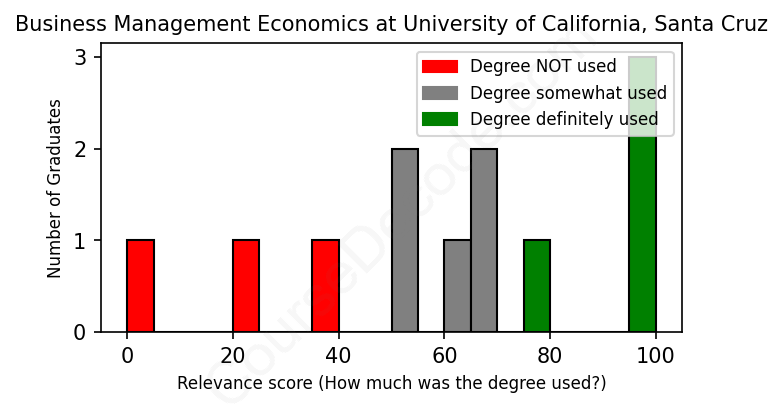
First, some facts. Of the Business Management Economics graduates from University of California, Santa Cruz we've analyzed , here's how many have used (or NOT used) their degree in their career:

These are estimates based on AI analysis of 12 LinkedIn profiles (see below).
The verdict? Below average. Overall, with an average relevance score of 60%, Business Management Economics graduates from University of California, Santa Cruz have a lower likelihood (-7%) of finding work in this field compared to the average graduate across all fields:
And for comparison, here's the chart for all profiles we've looked at across all degrees.
Also, after graduating, only 33% of these graduates have pursued further education other than another Bachelor's degree (such as a Masters degree or other), compared to the average across all profiles of 35%. This suggests a Bachelors degree is enough for most Business Management Economics graduates, and it's normal to look for work straight after graduation.
See the details:
|
Relevance score: 62% We think this person has gone into a career only somewhat relevant to their degree. We think this person has gone into a career only somewhat relevant to their degree.
DEGREE INFOGraduated in 2014 from University of California, Santa Cruz with a Bachelor's degree in Business Management Economics. No other secondary education since. JOB HISTORY SINCE GRADUATIONTeller III Bank of the Orient Jul 2014 - Sep 2016 Loan Assistant  Bank of the Orient Sep 2016 - Feb 2017 Operation Specialist (Part Time)  Bank of the Orient Mar 2017 - Present ABOUTCurrently a MSA student working part time at a bank. I am a dog lover who does not have any dogs. |
The top 10 most common jobs done by the graduates we've analyzed (ranked most common to least) are:
When looking at the jobs that graduates from the University of California, Santa Cruz with a degree in Business Management Economics have held, it’s clear that there's a mix of relevancy to the degree. Many individuals started off in roles like sales associates or customer service representatives, which usually focus more on interaction and support rather than the economic analysis or management strategies you’d expect to utilize in their field of study. A good number of their initial jobs, like being a Retail Sales Associate or a Customer Service Liaison, don’t require a strong application of business management economics principles, so they might not be directly relevant to their education.
However, as we move up the list into more experienced positions, it's evident that many graduates find roles that align more closely with their degree. Positions such as Financial Analyst, Economic Development Analyst, and even roles in economic consulting showcase a clear connection to the principles they studied. Many graduates transitioned into analytical roles where they applied their understanding of economics and business management, reflecting a stronger connection to their academic background after an initial phase of more general or unrelated jobs. In essence, while the early career paths might seem a bit off-course, there's a noticeable evolution toward more relevant roles as graduates gain experience and advance in their careers.
Here is a visual representation of the most common words in job titles for Business Management Economics graduates (this is across all Business Management Economics graduates we've analyzed, not just those who went to University of California, Santa Cruz):

The career trajectories of graduates from the University of California, Santa Cruz with a degree in Business Management Economics seem pretty varied, but there are definitely patterns you can spot. For many, first jobs tend to lean towards roles like market researcher, customer service representative, or sales-related positions. This indicates that recent grads often start in roles that are more entry-level and focused on gaining experience and skills. Eventually, some of them transition into positions that are more aligned with their degree, such as financial analysts or roles within economic development, which tends to happen 3 to 5 years after they graduate. Others might find themselves in different sectors, such as insurance or marketing, which, while not a direct link to their degree, still utilize skills they learned in school.
Fast forward to about 5 to 10 years later, we see some of these graduates climbing the career ladder into more specialized roles like financial planning or even starting their careers in the legal field. For those who ventured into finance or economic development, many land higher-level positions, and some even manage teams. However, not everyone has ended up in roles directly related to Business Management Economics; a fair number of graduates have held various service-oriented positions that don't quite utilize their educational background fully. Overall, while some alumni have certainly embarked on fruitful careers that align well with their studies, others appear to have taken a more winding path, showcasing that success comes in many forms after graduation.
So, a Bachelor’s degree in Business Management Economics, whether at UCSC or pretty much anywhere else, generally falls somewhere in the middle on the difficulty scale. It’s not as intense as something super specialized like engineering or medicine, but it’s definitely not a walk in the park either. You’ll have to tackle a mix of economics, finance, and management concepts, which means there’s a fair amount of math and critical thinking involved. Plus, you’ll have group projects and presentations to keep things interesting—some people love that, while others find it challenging. So, if you’re organized and willing to engage with the material, it’s definitely manageable, but it’ll require a decent amount of effort and time to really get the hang of everything.
Most commonly, in the LinkedIn profiles we've looked at, it takes people 4 years to finish a Bachelor degree in Business Management Economics.
Looking at the job histories of these UC Santa Cruz Business Management Economics graduates, it seems like they’ve had a pretty mixed bag when it comes to making decent money. Some of them, especially the ones who moved into financial analysis and law, are likely raking in a solid salary now, particularly those who have climbed the ladder into managerial roles. On the flip side, early jobs for others, like retail or customer service positions, probably didn’t pay very well, especially right after college. So, overall, it looks like there's a good chance some are doing well financially nowadays, while others may still be working their way up the income ladder with jobs that might not be so lucrative to start off with. It's definitely a case of "it depends" depending on where they are in their career paths!
Here is a visual representation of the most common words seen in the "about" section of LinkedIn profiles who have a Bachelor degree in Business Management Economics (this is across all Business Management Economics graduates we've analyzed, not just those who went to University of California, Santa Cruz). This may or may not be useful:

Here are all colleges offering a Bachelor degree in Business Management Economics (ordered by the average relevance score of their Business Management Economics graduates, best to worst) where we have analyzed at least 10 of their graduates:
| College | Score | Count |
|---|---|---|
 University of California, Santa Cruz University of California, Santa Cruz
|
60 | 12 |